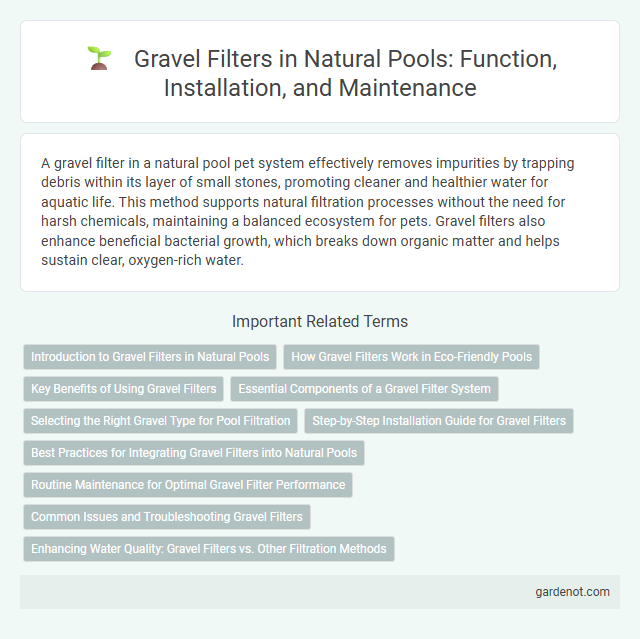A gravel filter in a natural pool pet system effectively removes impurities by trapping debris within its layer of small stones, promoting cleaner and healthier water for aquatic life. This method supports natural filtration processes without the need for harsh chemicals, maintaining a balanced ecosystem for pets. Gravel filters also enhance beneficial bacterial growth, which breaks down organic matter and helps sustain clear, oxygen-rich water.
Introduction to Gravel Filters in Natural Pools
Gravel filters in natural pools serve as a crucial biological filtration system, utilizing layers of gravel to remove impurities and support beneficial microorganisms. These filters enhance water clarity by trapping debris and promoting the breakdown of organic matter, thereby maintaining a balanced aquatic ecosystem. Designed to mimic natural water purification processes, gravel filters contribute to sustainable and chemical-free pool maintenance.
How Gravel Filters Work in Eco-Friendly Pools
Gravel filters in eco-friendly pools function by trapping impurities and organic matter as water passes through layers of specially graded gravel, promoting natural filtration and biofilm growth. This filtration process enhances water clarity while supporting beneficial microbial ecosystems that break down contaminants without chemicals. The gravel's porosity and surface area optimize aeration and nutrient cycling, maintaining a balanced and sustainable aquatic environment.
Key Benefits of Using Gravel Filters
Gravel filters enhance natural pool water clarity by effectively trapping large debris and supporting beneficial microbial growth, which promotes biological filtration. Their porous structure ensures efficient water flow and aeration, reducing the need for chemical treatments. Using gravel filters also extends the lifespan of mechanical components by preventing clogging and maintaining consistent filtration performance.
Essential Components of a Gravel Filter System
A gravel filter system is essential for maintaining water clarity and biological balance in a natural pool by trapping debris and supporting beneficial microorganisms. Key components include layers of washed gravel with varying particle sizes, a filtration bed to promote effective biofiltration, and an underdrain system that facilitates water flow and prevents clogging. Properly designed gravel filters enhance water quality by combining mechanical and biological filtration processes crucial for natural pool ecosystems.
Selecting the Right Gravel Type for Pool Filtration
Choosing the appropriate gravel type for natural pool filtration is crucial for maintaining water clarity and promoting efficient biological filtration. Optimal gravel typically consists of clean, rounded quartz or river stones sized between 4-8 mm, providing ample surface area for beneficial microorganisms to thrive and trap debris effectively. Avoiding crushed or sharp gravel prevents water channeling and ensures consistent filtration performance throughout the pool system.
Step-by-Step Installation Guide for Gravel Filters
A gravel filter installation for a natural pool begins by selecting clean, uniformly sized gravel to ensure effective filtration and water flow. Start by layering a geotextile fabric at the base of the filter bed, then evenly spread the gravel in 15-20 cm increments while compacting each layer lightly to avoid channeling. Finally, connect the filter bed to the natural pool's water circulation system, ensuring proper piping and placement to maintain efficient filtration and water clarity.
Best Practices for Integrating Gravel Filters into Natural Pools
Gravel filters are essential for maintaining water clarity and supporting biological filtration in natural pools by hosting beneficial microorganisms that break down organic matter. Best practices for integrating gravel filters include selecting appropriate gravel size between 8-16 mm to optimize water flow and maximize surface area for biofilm development. Regular maintenance such as rinsing the gravel to prevent clogging and strategically positioning the filter near water inlets enhances efficiency and promotes a balanced aquatic ecosystem.
Routine Maintenance for Optimal Gravel Filter Performance
Routine maintenance of a gravel filter in a natural pool includes regular backwashing to prevent clogging and ensure efficient water flow. Inspecting the gravel for debris buildup and replacing worn or compacted gravel enhances filtration performance. Maintaining a consistent cleaning schedule extends the lifespan of the filter and preserves water clarity.
Common Issues and Troubleshooting Gravel Filters
Gravel filters in natural pools often face clogging due to organic debris accumulation and fine particles, reducing water flow and filtration efficiency. Regular backwashing and removing trapped sediment are essential troubleshooting steps to maintain optimal performance. Monitoring pressure differentials and inspecting for channeling can help identify issues early and prevent long-term damage.
Enhancing Water Quality: Gravel Filters vs. Other Filtration Methods
Gravel filters enhance water quality in natural pools by effectively trapping large particles and promoting beneficial bacterial growth, which aids in organic matter breakdown. Compared to mechanical filters, gravel filters offer natural biological filtration without chemicals, improving clarity and reducing harmful pathogens. Their porous structure supports a balanced ecosystem, making them a sustainable and low-maintenance option for clean, healthy water.
Gravel filter Infographic

 gardenot.com
gardenot.com